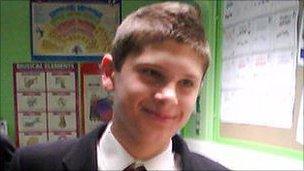Ben Robinson rugby inquest hears call for concussion training
- Published

Ben Robinson died after collapsing near the end of a schools rugby match
Mandatory training should be introduced for treating concussion during school sports, according to a coach whose teenage pupil died on a rugby pitch.
Carrickfergus Grammar School pupil Ben Robinson collapsed at the end of a match after being involved in a series of heavy tackles.
The inquest in Belfast heard the 14-year-old died from brain injuries.
Ben's coach Neal Kennedy said he still felt unprepared for dealing with a serious injury like concussion.
Seminar
In a letter read at the inquest, Mr Kennedy said: "The aftermath of this incident continues to play out week after week and beyond our school curriculum."
He claimed there was a lack of advice being given about concussion to coaches in schools.
"It needs to be disseminated to schools in a more coherent manner rather than in an ill-fated schoolmaster fashion," he said.
Mr Kennedy said a concussion seminar at Ulster Rugby's Ravenhill headquarters was sparsely attended, with the exception of staff from his school.
"This should be made compulsory for all coaches working with underage or adult players," Mr Kennedy wrote in a letter to the rugby authorities.
"I still feel unprepared in dealing with such a serious condition."
Ben died near the end of a match with Dalriada School in January 2011, just minutes after he was seen holding his head following an earlier challenge.
Coaching qualification
The inquest is examining whether he should have been taken off earlier with suspected concussion.
The year 11 pupil died from swelling of the brain which medical experts said could have been caused by two impacts affecting the head.
Mr Kennedy expressed his concerns to the chairman of the Ulster Schools Rugby Committee earlier this year and his letter was read to the inquest.
Its chairman, John Wilson, said dealing with concussion could become part of the required coaching qualification.
Carrickfergus Grammar principal Kieran Mulvenna told the inquest an agreed set of protocols would "hopefully create a safer environment for children" and provide clarity for parents.
"Where there is obligation there is no choice," he added.
A senior doctor unofficially in charge of first aid at the match said he was unsure whether he would have done anything differently following the first tackle Ben was involved in.
Dr Paul Loan, a consultant anaesthetist at Causeway Hospital in Coleraine, whose son played for the opposing Dalriada team, said: "For this to have happened was a shock at the time and I am not sure what I would have done differently.
"If I had known that, I might have been more pushy, for example, and gone over and said I need to examine that boy.
"I would think if I had said he has to go off the pitch they (the opposition) might have suspected I was doing it because he was a good player and wanted rid of him.
"I would not have been able to examine him with a degree of objectivity."
Dr Loan said Ben was on his feet by the time he approached to examine him, and the doctor had no further concerns.
'Not foolproof'
He ran on to the pitch when Ben collapsed following another tackle and gave him first aid but added that it quickly became apparent he had suffered brain stem damage.
Asked by the lawyer for Ben's family, Gabriel Ingram, about guidelines issued in May last year by the international rugby authorities, the doctor said they were not foolproof.
"I think it is a step in the right direction, we need to be more aware of the various tests but I think we also need to have a certain realism," he said.
He warned recommendations surrounding checking for concussion could apply to every tackle in rugby, most causing no lasting harm, and could affect the ebb and flow of the game.
As a parent, he said assessing every player after every tackle would mean he would not be able to watch the match and could require a person dedicated solely to that task with a form of payment.
State pathologist Dr Jack Crane said if Ben had suffered concussion, he should have been taken off.
However, he added it was for the inquest to decide whether he was concussed before his final collapse.
The inquest continues.
- Published29 August 2012
- Published1 February 2011